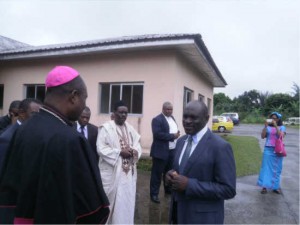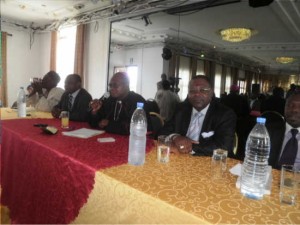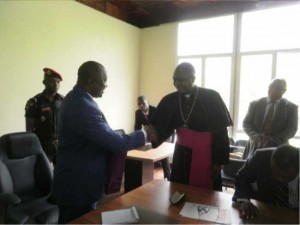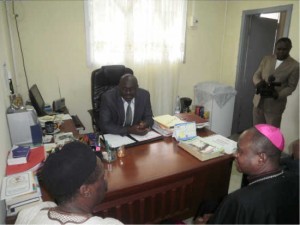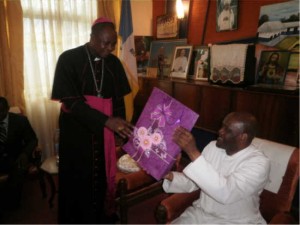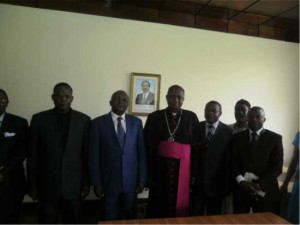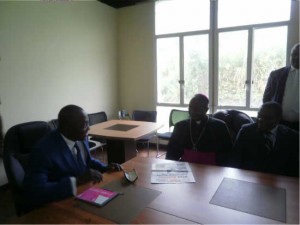By Walter Wilson Nana
Buea, Cameroon.
Bishop Joseph Befe Ateba of Kribi Diocese, who doubles as the President of National Communication Council, NCC, has said press freedom without any basic requirement or benchmark is inconceivable given that it is always exercised within a society where other fundamental freedoms of the individual have to be preserved.
On the third lap of a nation-wide tour in Buea, Wednesday, June 19 2013, Mgr Befe told media owners, journalists and students of journalism from the University of Buea, UB that the reference to professional ethics appears thus as a necessity. “The inclusion of such a necessity allows actors in social communication to comply with the rules and procedures to follow, to act well in their various activities,” he said.
In the meeting with journalists practicing in the Southwest Region, the NCC chair said he was not only on an awareness campaign to inform media practitioners on the January 23 2012 decree reorganising the NCC, which marked a substantial development in the statute and missions of the body, the NCC is poised to put order in the sector and also work to protect and enable media practitioners make gain from their practice.
The campaign, which started in Yaoundé, on September 15, 2012, continued in Douala and Buea, June 18 and 19 2013 respectively, focuses on “Stakes and Challenges in the Regulation of the Communication Sector in Cameroon”.
“The NCC awareness campaign is to let media men and women know what the regulation of the media sector in Cameroon is all about. The NCC is not a punitive body,” the chair said. He will add; “Our missions include ensuring the promotion of press freedom, emergence of a professional and responsible communication, the protection of peace and social order in the media sphere and to protect the viability of media houses.”
According to the NCC boss the doors to journalism in Cameroon will in the nearest future be shut from adventurers and unethical practices in the media landscape, promising hard times those who go contrary to the regulations in force.
Coming on the heels of complaints about immoral journalism practice, coupled with the invasion of the profession by quacks, Mgr. Befe said since the installation of its members on March 6, 2013, the NCC has received over 60 complaints on various cases of violations of professional ethics. Unlike before when the NCC was a simple advisory body, it now has more powers to deal with complaints against journalists and media organs since it is now a regulatory and consultation body with legal personality and financial autonomy.
The NCC Executive was reassuring, noting that through its decisions and opinions, the Council can ensure, among other things; the respect of laws and regulations on social communication, ethics and professional norms, the independence of public and private communication services, promoting the ideals of peace, democracy and human rights, equal access to the media, especially during elections, freedom and responsibility of the media and the protection of the dignity of people, including children and youth in the media.
Though the promises were taken in good strides to overhaul the media landscape, practitioners raised some worries; the closing down of media organs and suspension of programmes, the question of who is a journalist in Cameroon, the issue of poor pay of journalists especially those in the private sector and the imbalance in Government advertising. These were recurrent in the series of questions raised to the NCC chair and his collaborators.
The subject of who a journalist is in Cameroon and the criteria for becoming one was identified as the main cause of the inundation of the profession by charlatans.
Mgr. Befe recognized the difficulties encountered by the private press and that poor pay for most journalists was a problem. He will suggest that journalists be paid according to their training while assuring that the Council will make recommendations to cater for some of the worries noted.
He told media owners to be on the side of the law, enjoining them to regularise their situation, saying the sledgehammer will fall very soon. “However, the Council’s sole mission is not just to punish but also to protect journalists,” he mentioned.
Charles Ndi Chia, member of the Council resident in the Southwest Region and Editor-In-Chief of The Post Newspaper said journalists have to be responsible in the way they pursue their work adding that the NCC is a partner to the communication family in Cameroon.
Matute Menyoli of Mt. Cameroon FM, Buea, found in the outing of the NCC Executives a determined and ready effort to communicate to the users and observers of the institution. “This puts to rest the ill-feelings and wrong impressions some people have had of the Council. From the interactions with the media men and women, we are now convinced that the NCC is serious and out for real business.”
He prayed the Council to give a definition to who is a journalist in Cameroon, look into the pay packages of journalists practising in the private sector and reinforce the need for capacity building opportunities.
Other Stopovers
Before the heavily attended meeting with media owners and practitioners, Mgr. Befe made a courtesy call to the Southwest Regional Governor, Bernard Okalia Bilai. The latter entreated the former to get not only the local media involved in the celebrations marking the fifty years of the reunification of Cameroon slated for Buea.
Okalia Bilai also expressed a worry that a good portion of the Region do not receive CRTV signals and some newspapers of the country, “hence they are not abreast with government actions and other national developments,” he said.
Same worries were noted during the stopover at the CRTV Southwest Regional Complex, where the Director, David Chuye Bunyui said Ndian Division is still out of all Cameroonian telecommunication networks. “MTN and Orange Cameroon respectively are not present out there. CRTV is not present. When you are in that part of the country, it is Nigerian, Equato-Guinean, BBC and RFI radio stations that dominate,” Chuye mentioned.
A Bishop he is, Mgr. Befe could not saunter into Buea without checking on his spiritual brother, Mgr. Immanuel Bushu, Bishop of Buea Diocese. Both men shared ideas on how to facilitate communication between Buea Diocese and the NCC.
In the company of Mgr. Befe were his Vice President, Peter Esoka, the Secretary General, Dr. Jean Tobie Hond among other members of the Council.


